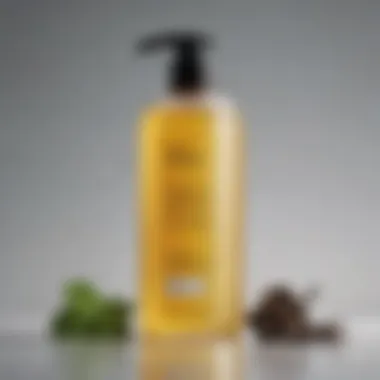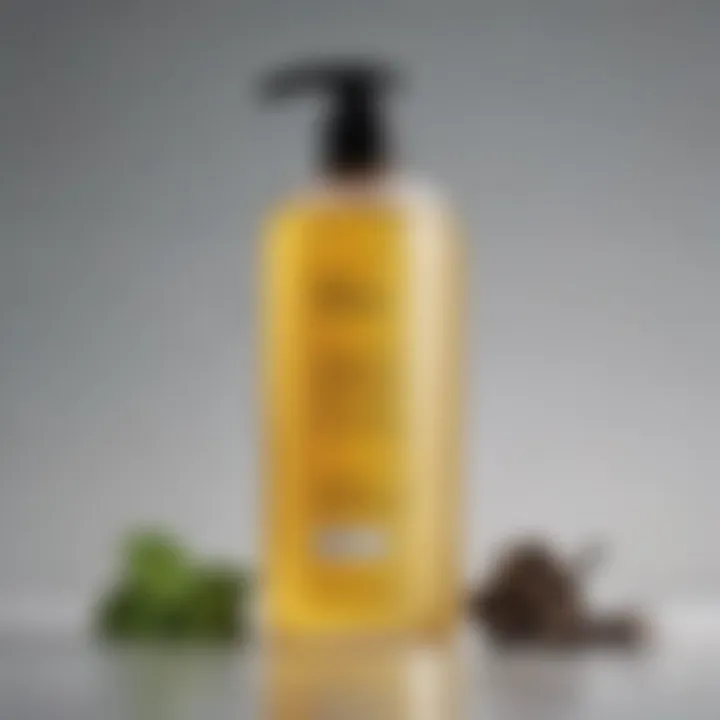Understanding Minimalist Shampoo Formulations for Hair Care


Intro
In today’s fast-paced world, many of us are seeking simplicity in our daily routines, particularly when it concerns our beauty products. Shampoos, often teeming with a myriad of ingredients, have become a focal point of this movement. The focus on minimal formulations in shampoos is gaining traction and for good reason. Simple can be better; fewer ingredients can mean less irritation, less confusion, and a clearer path to healthier hair. As we peel back the layers of shampoo formulations, it’s crucial to look at why minimalism is not just a trend but a valuable approach for various hair types.
Understanding the Minimalist Approach
The minimalist trend in shampoo formulations is relatively new, but it’s rooted in a desire for clarity and transparency. Consumers are more informed than ever, often researching the contents of their beauty products. They’ve grown wary of long ingredient lists filled with hard-to-pronounce chemicals and preservatives. Instead, there is a growing preference for shorter, more transparent compositions. The challenge often lies in distinguishing between marketing hype and actual benefits.
So why choose shampoos with fewer ingredients? The primary reason often revolves around sensitivity and scalp health. For individuals with delicate skin or scalp conditions, even the slightest irritant can result in discomfort. A formula that contains natural, familiar ingredients can significantly reduce the risk of adverse reactions, thus promoting overall well-being.
Moreover, minimal ingredient shampoos usually align better with the ideals of sustainability. As more consumers gravitate towards products that are kinder to both their bodies and the environment, brands that prioritize minimalism often utilize eco-friendly packaging and sources. As we embark on this exploration of simplistically formulated shampoos, we’ll consider their implications on hair health, efficacy, and consumer preference.
By the end of this journey, it should become clear how this straightforward concept of minimalism can yield tremendous benefits.
Why Minimal Ingredients Matter
When thinking about shampoos, many tend to overlook the impact of ingredients on hair health. In a society inundated with sleek marketing and flashy advertisements, it’s easy to get lost in the noise. However, there’s a significant layer of understanding beneath the intricate marketing that deserves attention.
Benefits of Fewer Ingredients
- Reduced Irritation: Fewer components generally mean a lower chance of irritation, especially for sensitive scalps.
- Enhanced Clarity: It becomes easier to determine what works and what doesn’t. Knowing exactly what’s in your shampoo helps build trust.
- Better Efficacy: Fewer ingredients can lead to more concentrated formulas, meaning each component can shine in its role.
Consumer Transparency
Today’s consumers want to know what they’re putting on their bodies. They resonate with brands that are transparent about their formulations. The essence of minimalism is not just about stripping away, but also about being clear and open about what remains. The extensive knowledge about potential drawbacks of certain chemicals leads many to prefer products that list natural or ‘clean’ ingredients.
"Knowledge is power, especially when it comes to what we choose for our bodies. "
Hair Types and Needs
Understanding that one size does not fit all is crucial in hair care. Different types of hair require different nutrients. While some may require deep moisture, others might seek volume or damage repair. It is vital to assess individual hair types while selecting shampoos with minimal ingredients.
Some hair types that benefit significantly from minimalist shampoos include:
- Fine Hair: These types often get weighed down by heavy formulations. A lighter, cleaner approach works wonders.
- Curly Hair: This hair type craves hydration. A minimal clean formula can provide essential moisture without loads of chemicals.
- Color-treated Hair: Stripping away harsh ingredients can help maintain color and shine longer.
Looking Forward
As trends continue to evolve, the beauty industry is seeing a shift towards more conscious formulations. This adjustment aligns with as increasing awareness regarding personal health and environmental impact. It’s an exciting time to stand at the intersection of simplicity and efficacy in hair care.
In the following sections, we’ll explore specific examples of minimalist shampoos that have carved a niche in the market, along with insights into their effectiveness for various hair types.
The Rise of Minimalism in Hair Care
In an age where excess has become the norm, the movement towards minimalism in hair care has gained significant traction. The focus has shifted from overwhelming options filled with unrecognizable jargon and questionable benefits to a framework that emphasizes simplicity and clarity. This evolution is not merely a fad; it reflects a broader cultural shift towards prioritizing quality over quantity. Consumers are no longer satisfied with just any product; they are seeking formulations that make sense, with a clear understanding of their purpose.
Minimalist shampoos stand at the forefront of this change. They eliminate the unnecessary, allowing users to know exactly what they're putting on their hair. By trimming down to only the essential ingredients, these products not only cater to a rising demand for transparency but also highlight the power of natural components. The push for minimalism reflects larger trends in lifestyle where people crave authenticity and sustainability.
Defining Minimalist Shampoo
Minimalist shampoos are those that contain few, carefully selected ingredients, designed to clean the hair without any overload on the scalp. Think of them as a breath of fresh air in a crowded beauty aisle filled with products boasting a laundry list of ingredients. Often, you will find that these shampoos forgo sulfates, parabens, and a number of synthetic additives, which have long spurred debates among consumers about their safety and efficacy.
But what is in a minimalist shampoo? Simple compounds often take center stage, including gentle surfactants derived from plants or natural oils that nurture the hair while cleaning.
"Less is more" is not just a catchy phrase; it’s a philosophy woven into the essence of minimalist hair care.
Consumer Demand for Simplicity
The demand for simplicity can be traced back to a growing awareness among consumers regarding the products they use. In our fast-paced world, taking a step back to question what we apply to our bodies has become increasingly prominent. Shoppers want to identify ingredients — not just read labels — and recognize their components with ease.
This quest for clear information has bridged a connection between consumers and brands willing to embrace transparency. For many, shampoos are viewed not only as a way to cleanse but also as an extension of self-care routines.
As women of all ages gravitate towards brands that echo their values of simplicity and authenticity, we see a shift United Nations has called for in cleaner beauty standards. The modern consumer isn’t just after a good-looking label; they want effective and safe products that respect their choices and the planet. Using shampoos with minimal ingredients reflects greater cultural aspirations toward less clutter in our lives, resonating deeply amidst our increasingly busy schedules.
Understanding Shampoo Ingredients
When it comes to choosing a shampoo, many people often overlook the significance of ingredients. However, understanding shampoo ingredients is paramount for making informed decisions. In today’s world, where we are increasingly becoming more aware of what we apply to our bodies, the ingredients in hair care products demand our attention. Minimalist shampoos often highlight their simplicity and transparency, but what does that really mean for our hair? The components in these products can make a dramatic difference in their efficacy and safety, especially for individuals with specific hair types or sensitivities.
Common Ingredients Found in Shampoos
Shampoos can comprise a plethora of ingredients, ranging from the well-known to the obscure. A few of the most frequently seen ingredients include:
- Surfactants: These are the cleansing agents responsible for removing dirt and oils from the scalp and hair. Sodium lauryl sulfate is a classic example, yet many minimal formulations opt for milder alternatives.
- Conditioning Agents: Ingredients like dimethicone serve to smooth and detangle hair, making it feel softer. However, minimalist formulas typically use lighter, plant-based alternatives such as jojoba oil.
- Preservatives: Necessary for shelf stability, these keep products safe from microbial growth. Look for those certified as gentle, such as potassium sorbate, especially if your skin tends to react to harsher substances.
- Fragrance: Often included to enhance user experience, fragrances can be synthetic or derived from natural sources. Minimalist brands often prioritize essential oils, which can also provide therapeutic benefits.


"The fewer the ingredients, the clearer the benefits—minimal shampoos often let nature do the talking."
While most shampoos contain these staples, a minimalist approach may eliminate unnecessary fillers or hard-to-pronounce chemicals that could irritate the scalp.
The Role of Each Ingredient
Understanding the role of each ingredient helps in demystifying the formulation of shampoos. For example, surfactants not only cleanse but can also impact how the product foams. A quick look at ammonium lauryl sulfate reveals that although it’s effective at cleaning, it can be too aggressive for some hair types, leading to dryness. Alternatively, gentler surfactants like cocamidopropyl betaine are less likely to strip natural oils yet still carry out effective cleansing.
Conditioning agents play a dual role; they don’t just smoothen hair — they also act as a protective barrier against environmental damage. Knowing this can guide consumers towards formulations that support their hair after washing, especially when it comes to curly or dry hair types.
Furthermore, many minimal shampoos will have preservatives stripped down to those that maintain the integrity of the product without compromising health or ethics. Look out for mentions of cruelty-free or environmentally friendly certifications here, as they can signal a brand's commitment to not just the consumer, but also the planet.
Benefits of Using Minimal Ingredient Shampoos
Minimal ingredient shampoos have gained traction in recent years, as consumers become more discerning about what they lather onto their hair. The shift towards simplicity isn’t merely a passing trend; it speaks to deeper concerns about hair health and overall wellness. Understanding these benefits is crucial for those looking to refine their hair care rituals, especially for women navigating various hair types and sensitivities. Here’s a deeper dive into the specific advantages that these minimalist formulations offer.
Reduced Allergens and Irritants
One of the standout benefits of using shampoos with fewer ingredients is the significant reduction of allergens and irritants. Traditional shampoos often lace their formulas with a host of synthetic fragrances, preservatives, and colorants, all of which can wreak havoc on sensitive skin. For many individuals, especially those prone to allergies or skin reactions, even a trace of these chemicals can lead to discomfort or irritation.
"Simplicity is the ultimate sophistication."
– Leonardo da Vinci
By switching to a minimalist shampoo, users can dramatically lower their risk of such adverse reactions. For instance, a product with natural ingredients like coconut oil or aloe vera provides effective cleansing without the typical laundry list of potentially harmful additives. Individuals reporting scalp conditions such as eczema or psoriasis may find relief by opting for these gentler alternatives, making it not just a choice, but a well-informed decision for healthier hair.
Easier on Sensitive Scalps
A sensitive scalp can be particularly challenging to manage. Many factors contribute to scalp sensitivity, ranging from environmental conditions to hair products laden with harsh chemicals. Minimalist shampoos often contain soothing ingredients that are less irritating than their more complex counterparts. This leads to a less aggravated scalp, promoting overall hair health.
Many users have discovered that when they simplify their shampoo choice, their hair feels cleaner, softer, and more comfortable. Furthermore, frequent use of basic ingredients allows the natural oils to flourish, helping the scalp maintain its own balance. Achieving harmony in the hair care routine ultimately fosters not just a healthier scalp but also enhances the overall quality of hair.
Sustainability and Environmental Impact
One cannot discuss minimal ingredient shampoos without highlighting their appeal from a sustainability standpoint. As people become increasingly aware of their environmental footprint, choosing a shampoo with fewer components can make a considerable impact.
Using less synthetic material results in less chemical runoff into our water systems, which is a win for aquatic ecosystems and overall environmental health. Moreover, many brands that focus on minimalism also adopt eco-friendly practices in packaging and sourcing, thereby promoting a more viable approach in the beauty sector.
- Sustainable sourcing: Brands may opt for natural ingredients harvested from renewable sources.
- Reduced packaging waste: Minimalist shampoos often come in recyclable or biodegradable containers.
- Lower carbon footprint: Fewer chemicals mean simpler production processes.
In a world that often feels overwhelmed with excess, minimal ingredient shampoos embody a refreshing approach to hair care that nourishes not just our hair but also our planet. By choosing wisely, consumers can contribute to a greener future while pampering themselves.
In summary, opting for minimal ingredient shampoos puts the focus back on quality rather than quantity in product formulation. As women navigate the hair care landscape armed with knowledge, they can discover which formulas resonate with their unique needs and beliefs, ultimately transforming their routines into something effective, simple, and smart.
Identifying Quality Minimalist Shampoos
In recent years, the hair care market has been flooded with products, often leaving consumers feeling like they’re navigating a maze. Amid this landscape, the task of identifying quality minimalist shampoos becomes paramount. These shampoos promise fewer ingredients but can still pack a punch when it comes to efficacy. Therefore, understanding how to evaluate these products is crucial not just for maintaining healthy hair, but also for aligning with personal values around transparency and simplicity in beauty products.
Why does it matter? Consumers are increasingly drawn to products that are straightforward. A clean label doesn’t just showcase minimalism; it signifies trust. Knowing how to select the right product can save time, money, and, importantly, reduce potential irritation or adverse reactions from complex formulations. In essence, identifying quality minimalist shampoos equates to making a smart, informed decision that reflects individual sensitivities and hair care needs.
What to Look for on Labels
When standing in front of a shelf full of bottles, it’s vital to scrutinize labels. The first thing to note is the number of ingredients. A genuine minimalist shampoo typically contains no more than ten components. However, it’s equally important to evaluate what those ingredients are.
- Natural Ingredients: Stay on the lookout for familiar names—think coconut oil or aloe vera. These often indicate a gentler formula.
- Absence of Harmful Additives: Common culprits include sulfates, parabens, and artificial fragrances. Distancing yourself from these can lead to a much more pleasant hair-washing experience.
- Transparent Sourcing: If the label mentions how and where the ingredients are sourced, it’s a positive indicator of quality. Brands that care about their ingredients typically are upfront about their origins.
- Certification Labels: Always pay attention to seals of approval, such as cruelty-free or organic. These can help differentiate quality products from those that may not be as reputable.
- pH Balance: A pH-balanced shampoo (generally around 5.5) can be beneficial in maintaining the scalp's health.
“Minimalist doesn’t mean lesser; it signifies a careful choice that stands against the chaos of unnecessary additives.”
Evaluating Product Claims
The next step requires a discerning eye towards product claims. Many brands tout their minimalist status, but not all deliver. Here's how to drill down:
- Understand Marketing Jargon: Terms like gentle, natural, or organic can be buzzwords. Look beyond the claims. Do they back them up with evidence? For instance, look for specific certifications or clinical studies.
- User Reviews: Often overlooked, the opinions of other users can provide real-world feedback on efficacy and potential side effects. Reddit and beauty forums can serve as a helpful resource to gauge public sentiment.
- Ingredient Efficacy: Not all natural ingredients are equally effective. Research how specific components contribute to hair health. For example, while a product may boast argan oil, it’s crucial to understand how it interacts with your hair type.
- Company Transparency: A reputable brand will often share detailed information regarding trials or sourcing practices. If they shy away from scrutiny, it’s a red flag.
Taking these steps not only fortifies the likelihood of selecting a quality shampoo but also reinforces the consumer's initiative towards healthier hair and sustainable practices. Educated choices in personal care can reflect broader ethics, championing the ideals of transparency and simplicity in the beauty industry.
How Minimalist Shampoos Work
When delving into the world of hair care, understanding how minimalist shampoos operate is essential. These formulations aim to strip away the noise and concentrate on what truly matters for your hair health. In an era increasingly leaning towards simplicity, the benefits of minimalist shampoos resonate deeply with consumers looking for straightforward solutions to their hair needs. Less really can be more, especially when we consider how a limited number of ingredients can lead to focused efficacy without unnecessary complication.
Cleansing Mechanisms Explained
The cornerstone of any shampoo is its ability to cleanse. Minimalist shampoos utilize basic surfactants to remove dirt and oil from the hair and scalp without the overwhelming presence of additives that can potentially disrupt the natural balance of your hair.


Surfactants work by reducing the surface tension of water, enabling it to spread and effectively break down grime. Traditional shampoos often rely on a cocktail of surfactants; however, minimalist options usually stick to one or two primary ones, like Sodium Cocoyl Isethionate, which is sourced from coconut oil. This simple yet effective approach ensures dirt is removed without stripping the hair of its necessary oils.
Here are a few key benefits behind this cleansing mechanism:
- Gentle on Hair: With fewer harsh chemicals, these shampoos tend to be less abrasive, reducing the risk of damage and dryness.
- Conservation of Natural Oils: By not over-cleansing, minimalist formulations allow your scalp and hair to retain essential oils, promoting overall health.
- Better for Daily Use: With a gentler clean, many users find they can wash their hair more regularly without worry.
In many ways, the cleansing action of minimalist shampoos is akin to a simple wash of your favorite delicate fabric—no need for fancy treatments when less is truly effective.
Hydration and Moisture Balance
While cleaning is critical, hydration is equally important. Minimalist shampoos often include a select few nourishing ingredients that boost moisture without overwhelming the product with unnecessary additives. A prime example is Glycerin, a natural humectant that attracts moisture from the air into your hair, promoting hydration without leaving it heavy or greasy.
Achieving a good moisture balance is crucial, especially for those who color or heat-style their hair.
Let's discuss why hydration matters:
- Maintains Hair Elasticity: Well-hydrated hair is less prone to breakage and split ends, ensuring your locks look vibrant and healthy.
- Smooths Frizz: Moisture aids in calming frizzy strands, far more effectively than silicones found in many conventional products.
- Enhances Manageability: Properly hydrated hair is easier to style and manage, giving a more polished appearance.
The careful selection of hydration-boosting ingredients allows minimalist shampoos to provide a nourishing touch, ensuring that the hair looks its best while remaining free of excess weight and product buildup. Striking the right balance between cleansing and hydration is not just a technical requirement; it's essential for creating products that respect the natural beauty of your hair.
Formulations for Different Hair Types
Hair care is not a one-size-fits-all approach. Different hair types have unique needs, and understanding these distinctions is crucial when choosing shampoos with minimalist ingredients. Minimalist formulations can address specific concerns without overwhelming the hair with unnecessary additives. Therefore, the discussion about formulations tailored to various hair types is of great significance in this article. We’ll break down key considerations and beneficial options for oily hair, dry or curly hair, and color-treated hair.
Optimal Choices for Oily Hair
The battle against oily hair can feel like a never-ending saga. People with oily scalps often find themselves washing their hair more frequently, sometimes several times a day. Minimalist shampoos designed for oily hair focus on balancing excess sebum production, keeping hair clean without stripping it of essential moisture.
Ingredients such as tea tree oil and witch hazel can offer a natural, effective approach. These ingredients have antimicrobial properties that help keep the scalp healthy while managing oil levels. Another wise move is choosing shampoos with gentle surfactants like sodium coco-sulfate, which cleanse without over-drying the scalp. It’s all about striking the right balance between cleansing and hydration.
- Look for formulas labeled as "clarifying" or "balancing."
- Opt for lightweight textures, as they tend to work better for this hair type.
Suitable Options for Dry or Curly Hair
Now, let’s turn our attention to dry or curly hair. Individuals with these hair types often face the challenge of maintaining moisture and elasticity. Minimal ingredient shampoos can provide the nourishment needed to combat dryness without using a long list of components that offer little value.
Shampoos that incorporate natural oils like argan oil or coconut oil can provide deep hydration. These ingredients not only condition the hair but also add a touch of shine and manageability. A formula rich in humectants, like glycerin, can pull moisture from the air into the hair shaft, which is particularly beneficial for those with curly locks.
- Choose products claiming to be "moisturizing" or "hydrating."
- Avoid sulfates and alcohols, which can exacerbate dryness.
Formulations for Color-Treated Hair
Color-treated hair deserves special attention, as it often requires products that can protect the color while maintaining hair health. Opting for minimalist formulations for color-treated hair can be a game-changer. Simple ingredients can provide effective care without compromising the vibrancy of the color.
For instance, look for shampoos with UV filters and antioxidants, which protect color from fading due to sun exposure. Additionally, naturally derived proteins from quinoa or silk can help repair and strengthen.
- Seek out shampoos labeled as "safe for color-treated hair."
- Check for pH-balanced formulas, as they help maintain the integrity of hair color.
Cultural Perspectives on Hair Care
The way people approach hair care is not one-size-fits-all; it’s a mosaic of diverse practices shaped by culture, tradition, and changing values. Hair is often seen as a reflection of one's identity, and the products chosen to care for it are informed by generations of knowledge and preferences. This section sheds light on how cultural perspectives significantly influence shampoo formulations, particularly in the context of minimal ingredients.
Traditions of Natural Hair Products
In many cultures, natural hair products have been an essential part of hair care routines long before the rise of commercial brands. Take, for example, the use of coconut oil in Southeast Asia, which not only provides moisture but also serves as a natural sunscreen for the scalp. Similarly, aloe vera, widely used across different societies, has been recognized for its soothing properties, making it a go-to for many looking to reduce irritation or nourish their hair.
In indigenous communities, specific plants have been revered for their hair care properties. The use of bark, roots, and leaves in African hair care traditions exemplifies an age-old understanding of natural ingredients that work well for different hair types. These traditions showcase an early form of minimalism in hair care, as the emphasis is placed on effectiveness without unnecessary additives.
The growing interest in natural and organic hair products is not merely a trend; it's a comeback to these ancient practices. As consumers become wary of the chemical-laden shampoos that have dominated the market, many are returning to these roots, seeking out products that are simpler and more aligned with their cultural heritage. By understanding these traditions, one can appreciate how these practices have laid the groundwork for the minimalist movement in modern hair care.
Global Trends in Minimalism
As the world becomes increasingly interconnected, the minimalism trend in hair care is spreading like wildfire. Cultures that once held their unique practices are now influencing each other, creating a rich tapestry of ideas and products. For instance, the Japanese practice of using rice water for hair health has gained a following far beyond its geographical origin. This trend highlights a growing recognition of how simplicity can go hand-in-hand with effectiveness.
Moreover, social media platforms such as Facebook and Reddit play a pivotal role in this evolution. Users share their experiences and tips regarding minimalist products, fostering a community that values transparency and simplicity. The dialogue promotes not just the use of fewer ingredients but also encourages consumers to educate themselves about what they're applying onto their skin and hair.
"Minimalism isn't just about less; it's about better. It's about knowing what works for you and your hair."
Global brands are taking notes, adapting their products in response to this consumer demand. The focus is shifting towards formulations that are transparent, where the ingredients list reads like a recipe you could make at home rather than a chemistry experiment.
In summary, the convergence of traditional practices and modern global trends signals a pivotal moment in the hair care industry. Understanding these cultural perspectives not only enriches the narrative around shampoo formulations but also underscores how far we've come in our quest for simplicity and effectiveness. As consumers delve deeper into their hair care choices, they align with long-standing customs that celebrate the beauty of reducing the excess.


Challenges and Considerations
When it comes to selecting shampoos, minimal ingredients often present a double-edged sword. While the allure of simplicity resonates with consumers, several challenges and considerations come into play. Understanding these aspects is crucial for anyone looking to navigate the often murky waters of hair care products. As shoppers become increasingly discerning, it’s vital to examine how minimalism translates into functionality and quality.
Misconceptions about Functionality
A prevalent misconception surrounding minimalist shampoos is that fewer ingredients automatically equate to lesser effectiveness. This belief can lead many to assume that a product lacking in preservatives, fragrances, or other additives is somehow inferior. However, the reality is often quite the opposite.
Fewer components can mean greater focus on each ingredient's role and efficacy. For instance, a shampoo with a limited formula may rely heavily on high-quality surfactants that efficiently cleanse hair without stripping it of essential moisture. By concentrating on what truly matters, these products can deliver results that rival their more complex counterparts.
"Sometimes, less really is more. A small number of high-quality ingredients can provide better results than an overload of additives."
It's essential to shed the notion that fancy-sounding ingredients equal better performance. Many traditional shampoos tout ingredients like silicones, which can create a temporary shine but lead to build-up over time. On the other hand, minimalist formulations often forgo such materials in favor of natural oils and extracts, offering a gentler yet effective cleansing experience.
Navigating Market Confusion
The beauty industry can be a tricky terrain to traverse, particularly when it comes to marketing claims. Shoppers might find themselves confronted with a barrage of labels that tout 'natural,' 'organic,' or 'sulfate-free,' but these terms aren't federally regulated. Thus, the burden often falls on consumers to educate themselves about what these labels truly mean.
Many minimalist shampoos leverage these buzzwords to appeal to eco-conscious buyers. However, it's necessary to resist the allure of marketing gimmicks and assess products based on their ingredients rather than their packaging. Here are some practical steps for cutting through the clutter:
- Review Ingredients Carefully: Look beyond the front label, and scrutinize the ingredient list. Prioritize products featuring recognizable and straightforward components.
- Check for Certifications: Seek products that are certified organic, cruelty-free, or non-toxic. Such certifications can help assure quality.
- Research Brands: Spend some time gathering information on the brand's values and practices. Understanding what they stand for can reveal if they genuinely align with minimalist principles.
Ultimately, being an informed shopper means juggling trends with a solid understanding of one's hair needs. Embracing the minimalist movement in hair care doesn’t mean compromising on quality; it’s about striking a balance between simplicity and efficacy.
When consumers put in the effort to understand the nature of minimalist shampoo formulations, they enhance their chances of making choices that are not only good for their hair but also aligned with their values and lifestyles.
The Future of Shampoo Formulations
As we look ahead in the realm of hair care, the conversation around shampoo formulations is not just picking up steam; it's evolving completely. Minimalist formulations are at the forefront of this movement, emphasizing fewer ingredients without sacrificing effectiveness. This future promises not only a shift in how products are made but also an alteration in consumer expectations.
Shampoos with fewer, cleaner ingredients align well with the growing demand for transparency and simplicity in beauty products. The prioritization of health, both for consumers and the planet, is reshaping the landscape. There's a notable future focus on sustainability, where brands are expected to reduce their carbon footprint while enhancing the health of the products they offer.
"A shampoo with just a handful of ingredients may be more effective than one laden with fillers and chemicals."
Innovation in Minimalist Products
Innovation is becoming synonymous with minimalism in shampoo formulations. As companies dive deeper into research, the quest for effective products that use less is gaining traction. This means that manufacturers are exploring natural alternatives and studying the properties of various ingredients more rigorously. For instance, instead of using a cocktail of synthetic fragrances and preservatives, brands are tapping into essential oils and plant-based compounds.
Some notable innovations include:
- Natural surfactants: Derived from coconut or corn, they clean without over-drying.
- Botanical extracts: Providing nourishment and health benefits by leveraging nature.
- Biodegradable packaging: Replacing traditional plastics with eco-friendly materials.
This shift not only targets consumers with sensitive scalps but also appeals to those conscious about their environmental impact. Brands that can effectively market these innovations are poised to lead the market.
The Move Towards Transparency
In today’s marketplace, consumers are not just looking at trends; they’re demanding authenticity and clarity from the products they purchase. The future of shampoo formulations will increasingly hinge on transparency. People want to understand what goes into their products, why certain ingredients are chosen, and the benefits they genuinely provide.
This transition has led many companies to:
- Provide clear labeling: This includes easy-to-understand language that breaks down the function of each ingredient.
- Share sourcing information: Knowing where ingredients come from can help build trust.
- Engage in consumer education: Workshops and online resources can aid in demystifying haircare choices.
Transparency is becoming a marketing necessity rather than a luxury. Companies that embrace this change can foster strong bonds with their consumers, establishing loyalty in an oversaturated market.
Overall, the future shines brightly for shampoo formulations that value both innovation and transparency. As expectant consumers become savvier and demand ethical practices, brands will need to adapt, ensuring that minimal ingredient shampoos not only meet but exceed their expectations.
Practical Tips for Consumers
Choosing the right shampoo can feel like a daunting task, especially in a market teeming with options that often promise more than they deliver. For consumers embracing a minimalist approach, understanding how to select a shampoo with fewer ingredients can make a world of difference in hair health and overall satisfaction. This section aims to demystify the process, offering practical advice tailored to individual needs while promoting a transparent and informed choice.
Choosing the Right Shampoo for Your Needs
When selecting a shampoo, it’s essential to consider your specific hair type and needs. Here are some practical tips to guide your decision:
- Evaluate Your Hair Type: It might sound basic, but recognizing whether you have oily, dry, curly, or straight hair dramatically influences your choice. For example, a minimalist shampoo designed for oily hair is often different from one meant for dry or curly hair.
- Assess Your Scalp Health: A healthy scalp is the foundation of good hair health. If your scalp tends to be sensitive or prone to irritation, choose a shampoo formulated to be gentle with minimal added fragrances or fillers.
- Prioritize Efficacy Over Hype: The latest trend might not be suitable for you. Look for shampoos that clearly communicate their benefits rather than following flashy marketing claims. A product with a simple ingredient list can often outperform its more complex counterparts.
- Conduct a Patch Test: If you are trying a new shampoo, especially one that is labeled as minimal, consider performing a patch test to avoid any allergic reactions. A small amount applied behind your ear can be a good start.
By taking these factors into account, you can find a product that not only meets your needs but also resonates with the ethos of simplicity and intention in your hair care routine.
How to Read Ingredient Lists
Understanding how to read ingredient lists is crucial for anyone seeking to adopt a minimalist shampoo. Here’s how to dissect them effectively:
- Start with the First Few Ingredients: Ingredients are listed in order of predominance. The first five items are the most significant components of the formulation. For minimalist shampoos, look for a short list where the first few ingredients are beneficial to your hair type, such as aloe vera or coconut oil.
- Identify Red Flags: Many common additives can cause irritation or allergic reactions. Keep an eye out for sulfates, parabens, and synthetic fragrances. If these are present in a minimalist shampoo, question whether it truly aligns with your goals.
- Look for Multi-Functional Ingredients: Often, a well-chosen ingredient can serve multiple purposes. For instance, jojoba oil not only moisturizes but also mimics the natural oils of the scalp, offering a dual benefit.
- Understand Natural Versus Synthetic: While many prefer natural ingredients due to their perceived safety, synthetic ingredients can sometimes enhance efficacy, especially in preserving formulations. A balance is key, and knowledge is power here.
"Good ingredients don't just promise a better wash; they contribute to the overall health of your hair in the long run."
Arming yourself with the ability to read and interpret ingredient lists can empower you to make wiser choices and tailor your hair care to fit precisely what you need.



